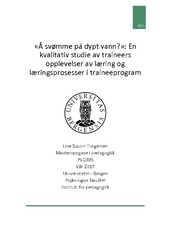«Å svømme på dypt vann?»: En kvalitativ studie av traineers opplevelser av læring og læringsprosesser i traineeprogram
Master thesis
Permanent lenke
https://hdl.handle.net/1956/16025Utgivelsesdato
2017-06-16Metadata
Vis full innførselSamlinger
- Department of Education [298]
Sammendrag
The subject of this master’s thesis is trainees’ experiences of being a trainee in two recognized and complex knowledge intensive companies. The main research question is «What characterizes trainee employees’ experiences of learning and learning processes in trainee programs in two knowledge intensive organizations?» This project is implemented within the framework of a sociocultural perspective on learning and has a constructivist approach to the research subject. Therefore, the research method is qualitative and the empirical material consists of eight semi structured interviews with trainee employees. The findings were categorized in four main categories with suitable sub categories. The first main category is called "Secure framework" and this category includes factors important for learning according to the trainees. Hence, the level of difficulty of work activites in which the trainees engage in and to which extend the activities are relevant for the organizations. The second category "Learning" describes the learning activities the trainees were given the opportunity to engage in and how the whole trainee program contributed to continuous learning. The topic in the third category called "Knowledge", is the different forms of knowledge the trainees learned and how they experienced the transfer of knowledge between different contexts. The last category called "The different roles of being a trainee" describes how the trainees experienced being both an ordinary employee and in a special position as a trainee at the same time. The trainees’ experiences of learning and learning processes in the trainee programs can be related to the concepts «Zone of proximal development» and «Scaffolding». Both formal and informal learning contexts can contribute to learning, but they need to complement each other. The findings indicate that the trainees experienced the trainee programs as a continuous learning process, simultaneously as they felt they could have been further challenged. Temaet for denne oppgaven er traineeansattes opplevelser av være trainee i to komplekse og anerkjente kunnskapsintensive organisasjoner. Problemstillingen lyder som følgende: Hva kjennetegner traineeansattes opplevelser av læring og læringsprosesser i traineeprogram i to kunnskapsintensive organisasjoner? Prosjektet er gjennomført innenfor rammene av et sosiokulturelt perspektiv på læring og har en konstruktivistisk tilnærming til forskningsfeltet. Forskningsmetoden er dermed av kvalitativ art og datamaterialet består av åtte semistrukturerte intervjuer med traineeansatte. Funnene i dette prosjektet er kategorisert i fire hovedkategorier med tilhørende underkategorier. I hovedkategorien "Trygge rammer" kommer faktorer som traineene mente var viktig for en god læringsprosess frem. Dette dreier seg om arbeidsoppgavenes vanskegrad og relevans for virksomheten, støtte fra veileder/nærmeste leder og kollegaer samt at traineene utgjorde støtte for hverandre. "Læring", som er den andre hovedkategorien, viser hvilke læringsaktiviteter traineene ble engasjert i og hvordan hele traineeoppholdet bidro med kontinuerlig læring. I hovedkategorien "Kunnskap" blir traineenes kunnskapsutbytte og hvordan de opplevde å overføre kunnskap mellom ulike kontekster beskrevet. Den siste hovedkategorien "Traineens ulike roller", innbefatter traineenes beskrivelser av det å fungere som en ordinær ansatt og samtidig være i en særegen posisjon som trainee. Traineenes opplevelser av læring og læringsprosesser kan ses i sammenheng med «Den proksimale utviklingssonen» og «Scaffolding». Både formelle og uformelle læringsarenaer var kilde til læring, men disse bør komplementere hverandre. Funnene indikerer at traineene opplevde traineeprogrammene som en kontinuerlig læringsprosess, samtidig som de også erfarte at de kunne blitt utfordret ytterligere.
